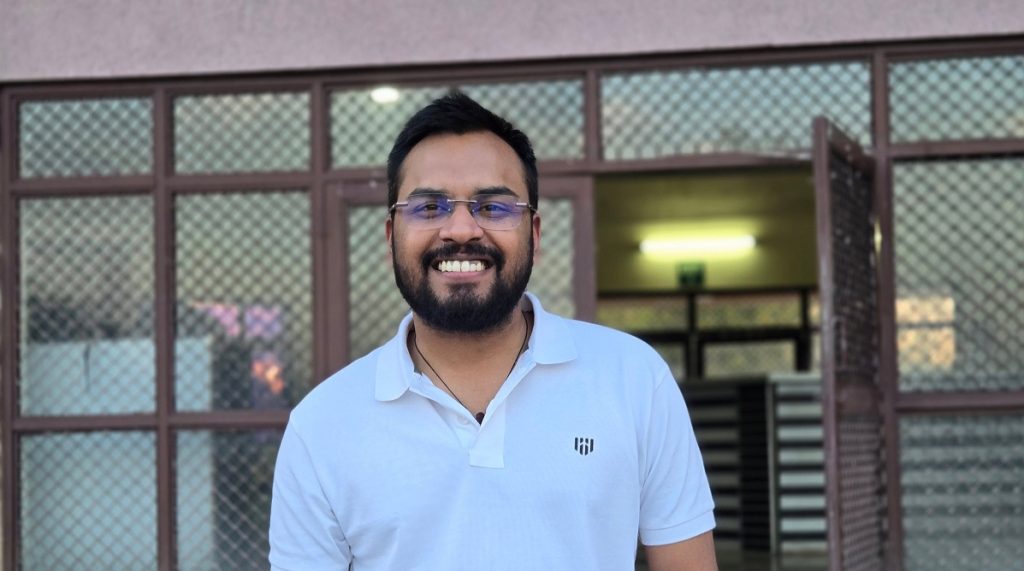This interview has been published by Anshi Mudgal and The SuperLawyer Team
Having graduated from NLU Jodhpur with a specialization in Business Law (Hons), what first motivated you to pursue law, and how would you describe your overall experience at law school?
Definitely a great question to start with – as I feel whatever skills I have gained to move forward in my life originated during my stint at NLU Jodhpur. In terms of motivation to pursue law, just like most of us, I took CLAT in 2012 only with the hope of securing an additional safety net, although I was initially more inclined towards pursuing something in mathematics or accounts (as I’ve always had that weird fascination with numbers). However, by God’s grace, when I got through and was admitted to my super-welcoming university, I promised to myself to not disappoint whoever has sacrificed and/or cheered for me in my journey. I distinctly remember my mom’s eyes suddenly becoming moist at the railway station when I told her that it’s time for her to board the train back to our hometown and I need to head back to the campus to set up my room and start with my studies. I knew then that I don’t have an option to screw it up this time. There are times when you must win – and I thought that that time had arrived.
Without compromising on my grades, I participated in whatever competitions the university was offering and eventually realised my inclination towards research and mooting. I met the bestest of the people in the university who fortunately have now become family for me. Even today, me and my friends randomly reminisce about our time in college with loud and unstoppable cheers, whether we’re in the car, in a restaurant or even in a different country! I was also lucky enough to meet seniors who gave me all the right advice that I have kept with me till date.
If I have to sum up my journey at NLU Jodhpur, I will give any amount to go back and relive those 5 years from 2012 to 2017 – of course, with the same set of people.
Starting your career with one of the biggest firms is a remarkable achievement. What was your experience like in the early stages, particularly while working on matters involving gaming start-ups, credit services, and Aadhaar-related compliance?
I started with Luthra and Luthra Law Offices in July 2017. Initially, I would get a little scared especially when I would listen to those convoluted discussions amongst my seniors on a particular matter. But I knew I just had to hang in there and realised quickly that all this profession requires from you is time and hard work, and hence, I was all game for that. Also, as the only son, I had made peace with the fact that moving abroad to study and work was not an option and that I had to be around for my parents. It was my time to give back and their time to enjoy, although I believe there’s nothing a son/daughter can do to repay whatever his/her parents have sacrificed.
In terms of cases/matters, since it was mostly a corporate advisory and restructuring team, the kind of work that I would get was extremely challenging and thought-provoking. I remember working on detailed memorandums for gaming start-ups offering fantasy leagues and VR gaming to the public, which would entail studying their proposed new business in detail and thinking of everything under the sun that may become applicable to them then and even later. Similarly, as a first/second year associate, apart from assisting on standard corporate and commercial queries, I would be asked to research on business ideas which were fresh then with no market precedent, such as e-gold, loan services by fintech companies, Aadhaar-based authentication, informal credit scoring etc. All these turned out to be super helpful for me and invigorated me to assist clients with out-of-the-box ideas and solutions.
In fact, whenever a FEMA query would be assigned to me, apart from obviously reviewing the framework governing the subject, I would have a habit of opening the index of the FEMA Manual and reviewing the listed items closely and to go to the relevant regulations that would appear to even be remotely applicable. In hindsight, this exercise has helped me a lot in strengthening my basics of FEMA and has given me the confidence to address most of the complicated structuring scenarios quickly.
In your current role, you advise on cross-border transactions such as those by Japanese conglomerate in various sectors such as infrastructure, manufacturing and renewable energy. How do you address the differences in legal regulations across jurisdictions especially in upcoming sectors?
It is always an enriching experience to assist and deal with clients from other jurisdictions such as Europe and Japan. Each client’s behaviour turns out to be different in terms of expectations from a law firm, deadlines, level of practical advice needed and their degree of preparedness for extreme circumstances. This assessment of clients’ requirements is something that one becomes aware of with time, after working with clients from multiple jurisdictions. In fact, if a matter is referred to by a foreign law firm, then our scope sometimes becomes limited to the requirements that the referring law firm may have, and all communications typically get routed through the firm.
With respect to the difference in legal regulations, the basic guiding principles likely remain the same (such as those governing commercial arrangements), they start differing depending on the sectors. For instance, sectors which are heavily regulated by the government such as defence, pharmaceutical, renewable energy, telecom etc. turn out to be fairly distinct from how they are regulated in other jurisdictions. Ultimately, we are required to focus on how the activities in the Indian territory (of a foreign company, its subsidiary or a standalone Indian company) will be governed, apart from other specific cross-border transactions (such as mergers, exports/imports, inbound and outbound investments etc.).
What inspired you to write on diverse legal topics, and how do you balance creativity with the demands of corporate law? Have insights from your writing shaped the way you approach your professional work? You have also published a poetry book on social issues. How has that influenced your urge to write professionally and at a personal level?
I believe writing really helps you understand the topic to its core, because you are required to take an additional responsibility for your understanding of the subject vis-à-vis the general public. It leaves very little room for any vagueness or conjectures, especially on settled areas of law. Further, writing on legal topics gives you an opportunity to also highlight areas of law which require attention of or clarification from the governmental authorities, with the hope that it would eventually reach the concerned official and necessary changes/clarifications would be made.
I have also generally been fond of writing, even on non-law topics. It has gradually turned out to be therapeutic for me, especially during times when I wish to say something but not out loud. I mostly quote the following by Stephen King from his memoir: “Words create sentences; sentences create paragraphs; sometimes paragraphs quicken and begin to breathe.” It has just helped me really appreciate that writing (whether on a professional front or otherwise) can really assist you in making those invisible, super-minor but important changes in your professional field and the general world.
You advised a UAE-based advisory company in acquiring a partial stake in a manufacturing company in Hyderabad. What were the key legal and commercial considerations you had to balance while structuring this cross-border transaction?
I think unlike a standard securities purchase transaction, this deal turned out to be convoluted given the already existing activities of the target Indian company (with diverse shareholders sitting in the company and the company being subject to multifarious licensing requirements under environmental, customs, labour and land laws). Firstly, the diligence itself took almost 3 months with the team working day and night just to gobble up thousands of documents and finally presenting the legal issues for discussion. Frankly, it became one of those deals which was dependent on resolution of a few legal issues as a condition.
Additionally, the transaction became murkier as we realised that the target company was also on the verge of insolvency. Hence, we were required to closely track the ongoing insolvency proceedings and keep a check on the timing of the transaction. We were also exploring if the client may rather wait it out and act as a resolution applicant once the target’s corporate insolvency resolution process commences.
What advice would you give to the younger generation of lawyers, and what resources would you recommend that can make a real-world difference in shaping their perspectives?
I read somewhere that you only know about a subject matter, if you have the capability to teach on that topic even to a layman. My recommendation always is to never rush into giving answers on a particular query/subject (if time permits), but rather to understand the rationale behind introduction of the specific law/provision in the first place. Once the legislature’s intention is clear, it becomes much easier to remember the principle, and accordingly, advise the client towards the right goal.
In terms of resources, apart from keeping abreast with the latest legal developments, it is extremely important to be aware of the business and geopolitical climate. Hence, do not shy away from taking all necessary subscriptions of informative magazines and journals, and do treat them like your OTT subscriptions. It is always a delight to read comprehensive articles which analyse a sector, an issue, a governmental order, a court decision etc., in detail. Some of the magazines/platforms I strongly recommend are The Ken, Finshots, HBR and The New Yorker.
How do your personal hobbies help you maintain work-life balance, and what lessons from your non-professional pursuits have you been able to apply to your legal practice?
Given the time that is required in our profession, it usually becomes difficult to manage personal hobbies with the incessant workflow. Hence, I have made peace with the fact that each day won’t permit me to pursue my hobbies to the extent I would want to. However, on all days, irrespective of the work pressure, I at least pull out 30-35 minutes for myself which are devoted towards something that I really enjoy because ultimately that is what all the work is for (i.e., to make myself capable to enjoy).
Through my non-professional pursuits, while I think I have with time realised the need to give importance to my hobbies without completely disregarding them because of work pressure, one important character trait that I have developed through my extra-curricular activities is resilience. For instance, on days when I go out for my exercises in the morning, as soon as I complete the goals for the day, it gives me a positive sense of achievement and that faith to keep pushing and to understand the power of ‘one more’. I have tried to apply the same principle even on the professional front to keep trying to push boundaries and becoming indefatigable (especially during pressure times).
What guiding motto or philosophy has consistently stayed with you throughout your journey, shaping both your personal and professional life? Looking ahead, what vision do you hold for the future of your practice and the kind of impact you aspire to create through your work?
I think the most important thing that I wish to communicate is to stay fit and healthy. In the end, nothing would matter if your body starts reacting instantly to fatigue and stress, which would make you gloomier and disheartened. By fitness, it is not only taking care of your physical health by exercising and eating healthy (of course, a chicken biryani or golgappa at calculated times won’t hurt), but also mental health. Try giving yourself at least those 15 minutes during which you acquire that void, and which transport you to a place that makes you smile (even though in imagination).
Secondly, keep exploring yourself and trying to acquire skills. If such a skill helps you both professionally and personally, nothing better. If you have INR 10,000, don’t rush logging into Amazon or go to a Rare Rabbit/Mango store, but rather consider investing that amount in learning a new skill. That decision would likely give you more returns than purchasing a new gadget or a piece of cloth. I learned of this concept called ‘autotelic’ as per which, at times, you need to do something for the sake of doing it. Try applying this in anything that you’re practising/learning, and you’d surely notice the magic of investing in yourself.
Lastly, never stop loving yourself and others and remaining grateful to your fate for giving you whatever you have today. This feeling has always helped me remain committed to my work, whatever the case may be.
Get in touch with Shivesh Aggarwal –




No comment provided.